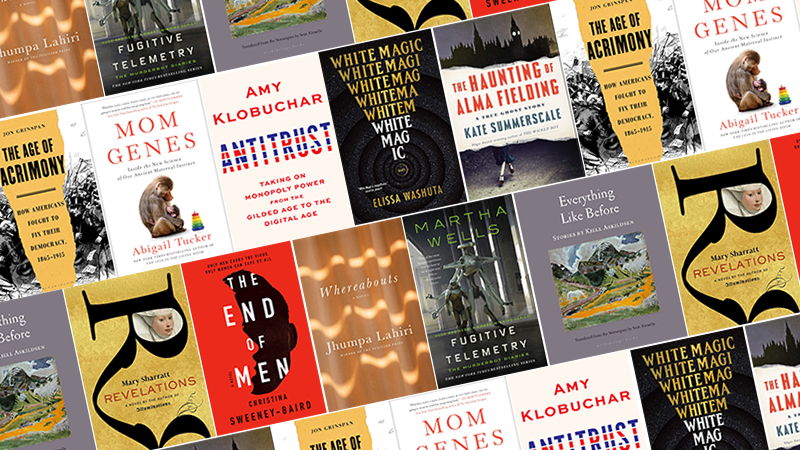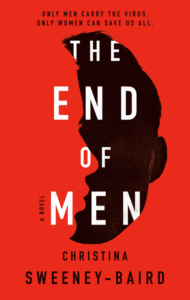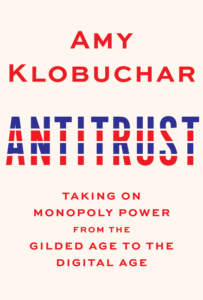
Jhumpa Lahiri’s Whereabouts, Martha Wells’ Fugitive Telemetry, Kate Summerscale’s The Haunting of Alma Fielding, and Amy Klobuchar’s Antitrust all feature among the Best Reviewed Books of the Week.
1. Whereabouts by Jhumpa Lahiri
(Knopf)
8 Rave • 7 Positive • 3 Mixed
Read Jhumpa Lahiri on the joy of translation as discovery here
“This is a very internalized novel, where nothing really occurs. We learn about our unnamed protagonist’s past (her father died when she was a teen) and her present (she can’t sleep well unless she hears the city traffic), and how then and now intersect … In this beautiful novel, which might not appeal to fans of plot-driven narratives, the reader becomes immersed in the head of its subject … Without artifice, Lahiri’s elegant phrases throughout the book reveal as much about her character as they do about the author’s understanding of her environment and the people who inhabit it … this reviewer’s sole regret is that he wishes Whereabouts was longer so he could linger a bit more with Lahiri’s meditative and lyrical prose.”
–Jim Carmin (The Star Tribune)
2. Fugitive Telemetry by Martha Wells
(Tor)
3 Rave • 4 Positive
“Where most of the other Murderbot stories are in the action-adventure mode, Fugitive Telemetry belongs more to the locked-room murder-mystery school, and the less hectic, more introspective style doesn’t always show Murderbot to best advantage. This is a petty cavil, because it’s still pretty great … an interesting hybrid of murder mystery and space adventure. From the beginning of her career, Martha Wells’s characters have been relatable, understandable, complex, and human; her worldbuilding deft and interesting, filled with graceful detail and implying a universe beyond the page. The Murderbot stories continue this trajectory, with an entertaining protagonist – the incredibly relatable Murderbot – and a wry, witty, darkly humorous voice.”
3. Everything Like Before by Kjell Askildsen
(Archipelago)
2 Rave • 2 Positive
“Deftly translated by Séan Kinsella, this selection of odd, austere yet transfixing stories from various points of Askildsen’s long career showcases his stylistic verve and his relentless scrutiny of human frailties and absurdities … In the space of just six pages Askildsen manages to perplex, unsettle and even amuse his reader … The trick here and elsewhere is not to ask who’s who or what’s what. Instead it pays to just succumb to the strange and inexplicable circumstances, to accept each peculiar encounter or bizarre cause and effect … We might not always understand his characters’ actions, much less their thinking, but it is hard not to be entranced by his stripped-back prose, or the original way in which he depicts the agony of empty lives and the trials of everyday existence.”
–Malcolm Forbes (The Star Tribune)
4. Revelations by Mary Sharratt
(Houghton Mifflin Harcourt)
2 Rave • 1 Positive • 1 Mixed
Read Mary Sharratt on why we need more stories about older women here
“The pilgrimage sections are rescued from tedium by Margery’s heedlessness of social opprobrium and her resulting clashes with fellow pilgrims. Readers will root for Margery as she wins friends among a minority of kindred spirits, who, like her, dare to imagine such heresies as Scriptures in English and women writing books … Sharratt’s gift for grounding larger issues in everyday lives makes for historical fiction at its best.”

5. The End of Men by Christina Sweeney-Baird
(G. P. Putnam’s Sons)
1 Rave • 3 Positive
“The afterword to this chilling dystopian debut thriller, which centers on life in a more-lethal-than-COVID epidemic, notes that it was written before our current pandemic; it gets so much right, though, from day-to-day headaches to deep despair … Sweeney-Baird skillfully re-creates the head-spinning feeling of watching the virus pop up here, then there, and ever closer to home, and of its systematic destruction in every corner of society … Sweeney-Baird’s look inside the heads of these and other shocked, desperate characters and her portrait of a bizarre new world are both thought- and fear-provoking. Readers will either wolf this down or elect to stay miles away from it, but controversy moves titles off the shelf. A top choice.”
–Henrietta Verma (Booklist)
**
1. White Magic by Elissa Washuta
(Tin House)
7 Rave • 2 Positive
Read an interview with Elissa Washuta here
“Nothing is comfortable in these essays, which labor through the muddy waters of intergenerational trauma, imperialism, capitalism and misogyny, using popular culture … But this book is not about despair; it’s about sifting through the broken shards of culture, looking for messages to restore one’s spirit … Instagram psychologists encourage people to take active ownership of their problems, but White Magic rightly recognizes the weight of historical trauma on those living today—violence that is embedded, like a poison, in bodies and land … Though White Magic is a book of essays, it reads like a single piece, as circuitous and ambiguous as special agent Dale Cooper’s journey through the Black Lodge … Washuta is capable of something more powerful: making sense of hard realities through deep rumination—a sort of magic … In consumer culture, where alcohol abuse is not only accepted but also actively encouraged, Washuta’s recovery is deeply powerful … With that knowledge and power behind her, it will be exciting to see what this talented writer turns her attention to next.”
–Jessica Ferri (The Los Angeles Times)
2. The Haunting of Alma Fielding by Kate Summerscale
(Penguin Press)
4 Rave • 5 Positive
Read an excerpt from The Haunting of Alma Fielding here
“… isn’t just the narrative of Fodor’s investigation of Fielding—it’s also a narrative about women and power, about anxiety of the unknown and the fear of looming war, about the choices people make (consciously or unconsciously) in order to escape certain aspects of their lives … Summerscale’s writing is so inviting, the historical details folded into the narrative so well, that The Haunting of Alma Fielding reads like a novel you don’t want to put down. (The book design is also superb, the typeface somehow evoking something old and mysterious while also being easy on the eyes.) Best of all, it offers a variety of possibilities without definitively landing on one single answer; the book recognizes that, sometimes, the answer to the question ‘Was it real or was it fake?’ is simply ‘Yes.'”
–Ilana Masad (NPR)
3. The Age of Acrimony: How Americans Fought to Fix Their Democracy, 1865-1915 by Jon Grinspan
(Bloomsbury)
2 Rave • 4 Positive
“It’s not every day—it’s not every year—that a book appears that upends all the guiding historical views of the age. Then again, Jon Grinspan’s The Age of Acrimony is that rare disturbance in the waters of the historiography of 19th-century America. It is an engaging, inviting, and ultimately disruptive story of what happened between the assassination of Lincoln and the sinking of the Lusitania, though neither really serves as a bookend to Grinspan’s argument … Grinspan offers us two books crammed into one hardcover binding … There are times when the Kelley story seems a digression, but then again there were historical digressions aplenty in that era. Suffice it to say that their passage serviceably illuminates the country’s—from blustery winds of partisanship to more gentle (and genteel) breezes of reform that in time define the country even as they upend the nature of what it is to be an American in a broad half-century period … Overall, Grinspan delivers a compelling look at America in this period, devoid of the clichés and cloying generalizations of textbook history.”
–David M. Shribman (The Boston Globe)
4. Mom Genes: Inside the New Science of Our Ancient Maternal Instinct by Abigail Tucker
(Gallery Books)
1 Rave • 5 Positive • 1 Mixed
“Meticulously researched and well-documented, Mom Genes is one part memoir (Tucker intersperses her own experiences as a white mother of four children), and one part incredibly readable popular science … Richly entertaining, filled with humor, and deeply informative, this engaging book is recommended for mothers, potential mothers, and anyone who has ever known a mother.”
–Ragan O’Malley (Library Journal)

5. Antitrust: Taking on Monopoly Power from the Gilded Age to the Digital Age by Amy Klobuchar
(Knopf)
2 Rave • 3 Positive • 1 Mixed
“A history of antitrust policy may not sound like the most compelling raw material for a page turner. But the book is an impressive work of scholarship, deeply researched—it has over 200 pages of footnotes—highly informative and surprisingly readable in the bargain … The great virtue of Klobuchar’s history is that it takes us back to the formative years of antitrust, when the operating rules governing American capitalism were still very much in flux. It is a reminder that the way industries are organized and markets allowed to function are not determined by inexorable forces outside our control but are matters of social and political choice … There is little to argue with here. Nevertheless, it is hard to believe that this is all it will take to arrest and reverse decades of growing corporate power and fundamentally change the economic landscape in the United States … Klobuchar has probably exaggerated the adverse consequences of the last 30 years of laissez-faire policy toward corporate power, and the same reasoning causes her to overstate the potency of reversing it. Perhaps she should temper her enthusiasm, evident throughout this book, for Woodrow Wilson and his zeal for a vigorous antitrust policy, and rebalance it with some of Theodore Roosevelt’s skepticism.”
–Liaquat Ahamed (The New York Times Book Review)

